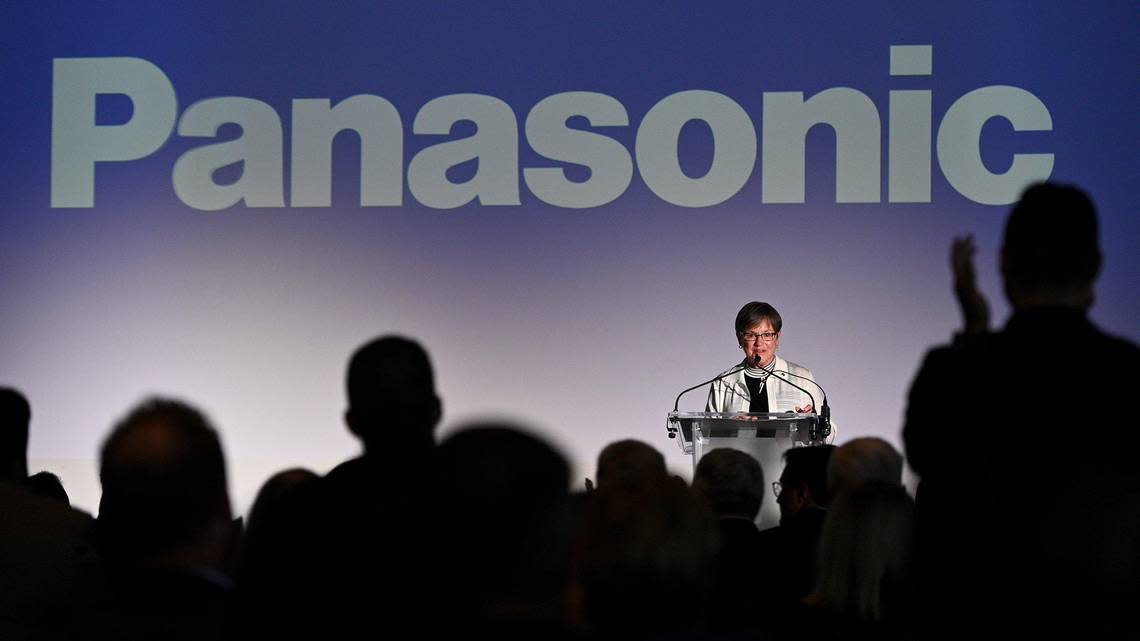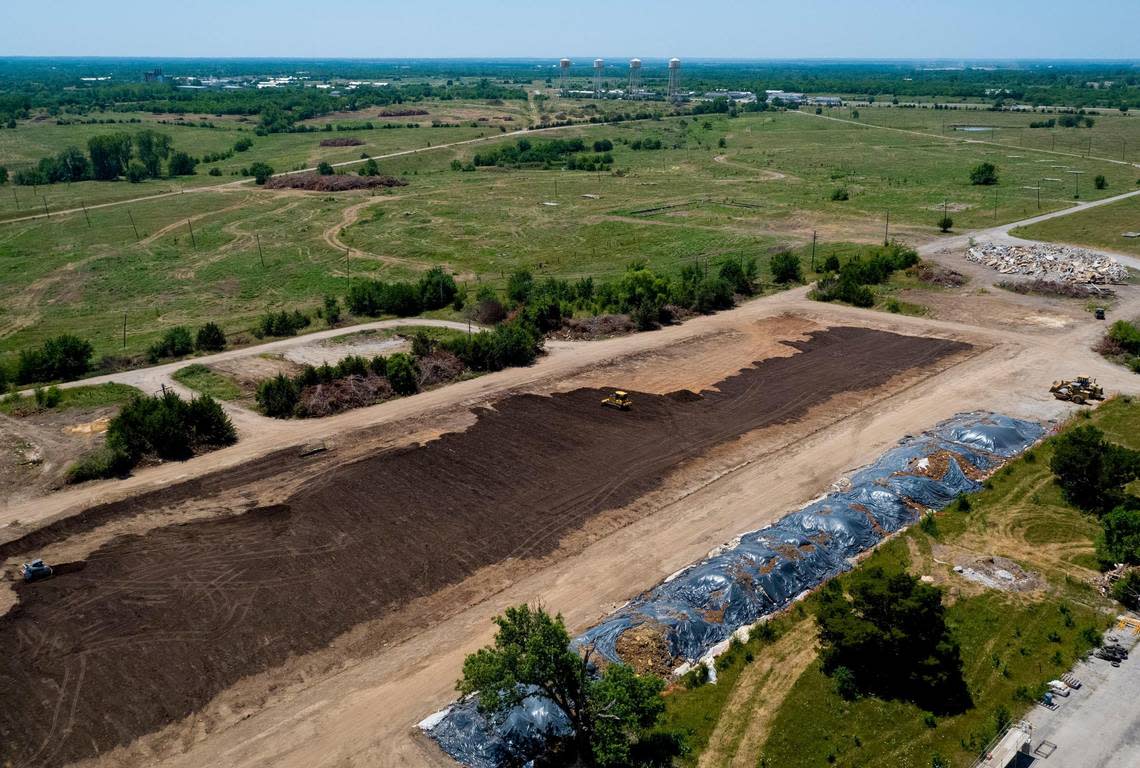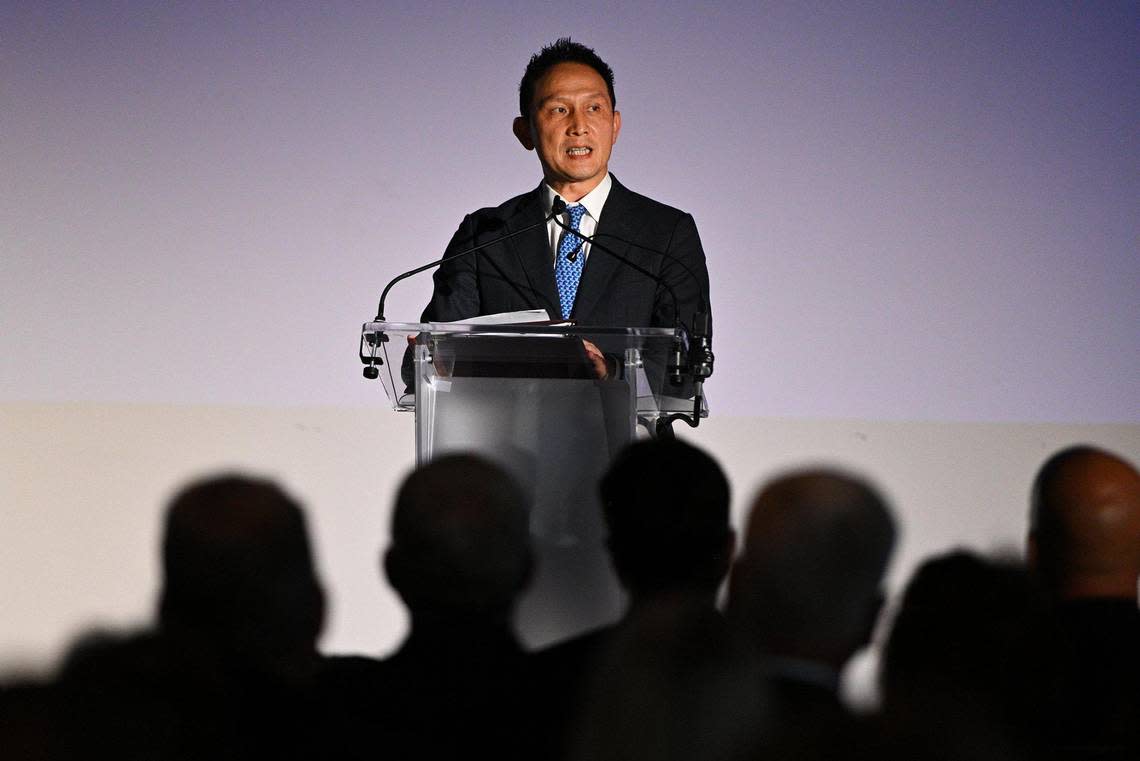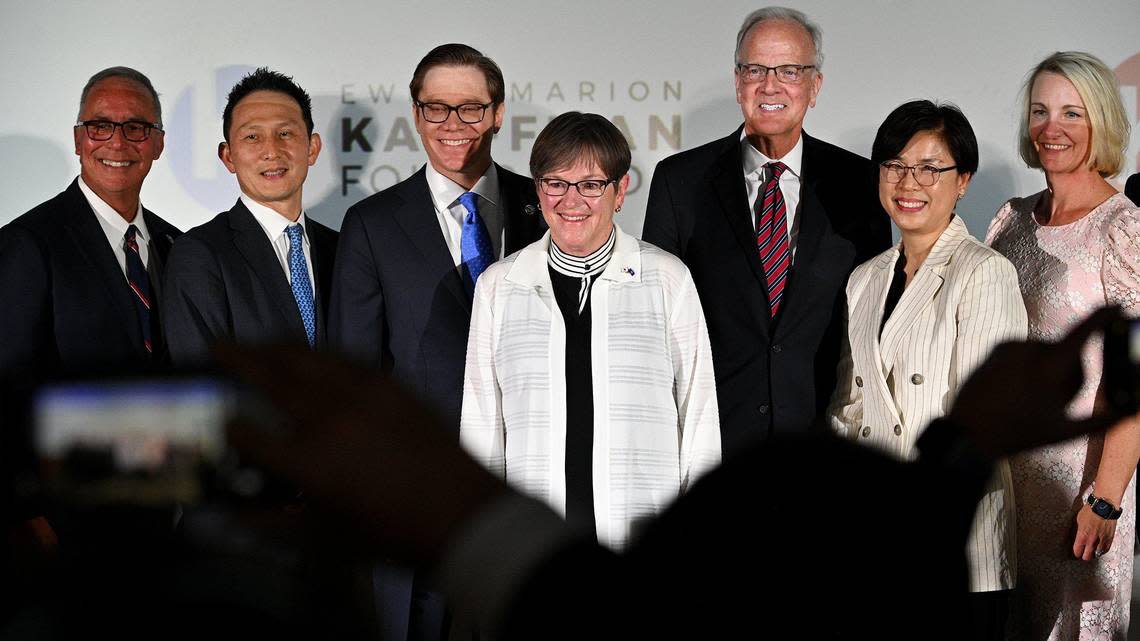Here’s how much Kansas offered Panasonic to bring massive battery plant to De Soto
After months of secrecy, Kansas officials finally broke their silence Wednesday to officially announce that Panasonic will build a $4 billion battery factory in Johnson County.
The Japanese electronics giant told a group of civic and business leaders gathered in Topeka that it plans to build a new factory on a portion of the former Sunflower Army Ammunition plant south of K-10.
Gov. Laura Kelly said Panasonic’s factory would go down as the largest single business investment in the state’s history.
“This is a huge day for the state of Kansas,” she said.
To lure Panasonic, the Democratic governor convinced the Republican-led Legislature to create the state’s largest ever subsidy program aimed at recruiting business investments of $1 billion or more.
While early estimates put the cost of the incentives at $1.3 billion, the Kansas Department of Commerce on Wednesday said Panasonic would be eligible for $829 million in tax credits, exemptions and other incentives. The state’s new incentive program created refundable tax credits, which allow firms to not only reduce their tax burdens but receive cash from state coffers for meeting certain hiring and investment goals.
Paired with an expected local property tax incentive from De Soto, the state deal means taxpayers will fund close to a quarter of the projected $4 billion cost of the project.
Kelly said the cost to the state would more than be recovered by Panasonic’s investment, both in full-time employees and the thousands of construction crews who will build the factory.
“It takes money to make money and this is an investment,” Kelly said. “We will get an incredible return on investment.”

If Panasonic hires the 4,000 expected employees, it would become one of the largest employers in Kansas. And it would tie with T-Mobile as the 12th largest nongovernmental employer in the Kansas City metro area, according to the Kansas City Area Development Council.
Kelly said the jobs would pay a little over $50,000 a year on average.
State officials cited general factors like the state’s business climate and central location for choosing the Sunflower State over rival Oklahoma, the other finalist for the project.
But Kansas Senate President Ty Masterson, an Andover Republican, said inflation nearly killed the project. Panasonic was set to announce the winning state in March, but delayed the news for several months.
“The massive inflation we incurred almost cost the deal, I mean, not just to Kansas but altogether,” Masterson said.
The Kansas City area won out in part, he said, because it touts a larger workforce than its primary competition.
Oklahoma leaders were trying to lure Panasonic to an industrial park in Pryor, about 45 minutes away from Tulsa. That metropolitan area has a population of about 996,000; the Kansas City metro boasts more than 2.1 million residents.
Masterson has been critical of other Kansas incentive programs, but championed the legislation for Panasonic.
“I’d much prefer an incentive like this that incentivizes this kind of stable generational growth,” he said. “It’s akin to bringing aviation to Wichita, which is still there 100 years later.”
‘We can win big’
Panasonic will build its sprawling new factory just south of De Soto at the Sunflower Army Ammunition site. The U.S. Army has been working for years to clean up the World War II-era site, believed to be the largest undeveloped site in the Kansas City metro area.
The Army has set 2028 as its target date for completing most of the cleanup effort, but city officials insist much of the area has been cleared for redevelopment.

Panasonic’s decision to build the factory is pending approval from the corporation’s board of directors, but civic leaders said the company aims to open by 2024. While executives attended Wednesday’s events, all declined to answer questions from local media.
“Kansas has an impressive history of being home to a skilled manufacturing workforce,” Kris Takamoto, executive vice president of Panasonic Energy Co. said in a news release. “We appreciate Kansas’s dedication to sustainability and its commitment to and growth in the clean and renewable energy space.”

With the news, Kansas will get a piece of the growing electric vehicle market and add manufacturing jobs — which have declined across the Midwest in recent decades.
Rapidly shifting consumer preferences for hybrids and electric vehicles has pushed legacy auto makers and startups to spend billions to perfect the technology and meet demand. And batteries make up about one-third of the total costs of electric vehicles.
“This shows that not only can Kansas and the Kansas City region compete, but we can win and we can win big,” said Tim Cowden, president and chief executive of the Kansas City Area Development Council, which works to recruit businesses.
But some lawmakers said Kansas is setting a dangerous precedent of picking winners and losers with the powerful tool.
“It would be great if they were coming on a level playing field but it’s not. A Kansas business could not have gotten these incentives,” Sen. Caryn Tyson, a Parker Republican who is running for treasurer, said.
Aside from bringing a new industry to the region, government officials said the arrival of Panasonic could help alleviate supply chain issues underscored during the pandemic.
“We should be reminded that this decision to come to Kansas is also a decision to come to the United States of America and not some place outside our borders,” said U.S. Sen. Jerry Moran, a Kansas Republican. “This helps make us less dependent on China. It improves our job capabilities and increases our national security.”
A secret process
At Wednesday’s announcement, Lt. Gov. David Toland presented the project as a product of the Kelly administration’s overhaul of the commerce department.
“At the highest level the governor’s directive meant that we should ground ourselves in the principle that economic development is about people,” Toland, who is also commerce secretary, said.
He listed examples of that principle in action including “that people should know what incentives the state invested in the new company that’s coming to their town.”

But the process to lure Panasonic was shrouded in secrecy. The agency asked lawmakers to pass APEX, the largest economic incentive package in state history, because Kansas was a finalist for a mega factory, but would not name the company behind the project. Some lawmakers signed non-disclosure agreements to learn the full details during the process.
Even as Asain media reported the news Wednesday morning, Kelly and state lawmakers refused to speak about the project until the company’s formal announcement.
The Kansas State Finance Council, which must approve incentives targeted for Panasonic, met in closed session Wednesday afternoon. That body, which includes the governor, discussed and approved an agreement with an undisclosed company but did not disclose details of the deal.
Kelly characterized the unusual secrecy as the cost of doing business.
“We did what we needed to do to ensure the confidentiality of the company, that’s the way business works,” Kelly said later. “These companies need the confidentiality that are provided through the NDA’s.”
The lack of transparency, however, led to pushback within the Legislature from Republicans and Democrats.
State Rep. Tim Johnson, a Basehor Republican whose district includes the Sunflower plant, said he learned any details about the project from the media.
“I just have a problem in government when you’re talking billions of dollars and people say trust me, this is good for us,” said Johnson, who voted against the incentive program.
State Rep. John Carmichael, a Wichita Democrat who voted against the bill, called for transparency moving forward.
“There has been a long pattern of unkept promises,” Carmichael said about the state’s record of using incentives to lure businesses. “Whether this is $1.3 billion or $150,000 it represents government picking winners and losers. Businesses who know how to polish brass at the department of commerce, no matter who the governor is, they receive taxpayer dollars.”
Greg LeRoy, executive director of Good Jobs First, which tracks economic development projects and incentives across the country, said he accepts that some secrecy could be required in negotiating particulars of a project. But once an agreement is made, the public deserves a chance to weigh in, he said.
“When you have a process like Kansas has just done, it’s highly undemocratic,” LeRoy said. “And you wonder why people are cynical about corporations having too much power over government policy. It’s exactly because of episodes like this.”
